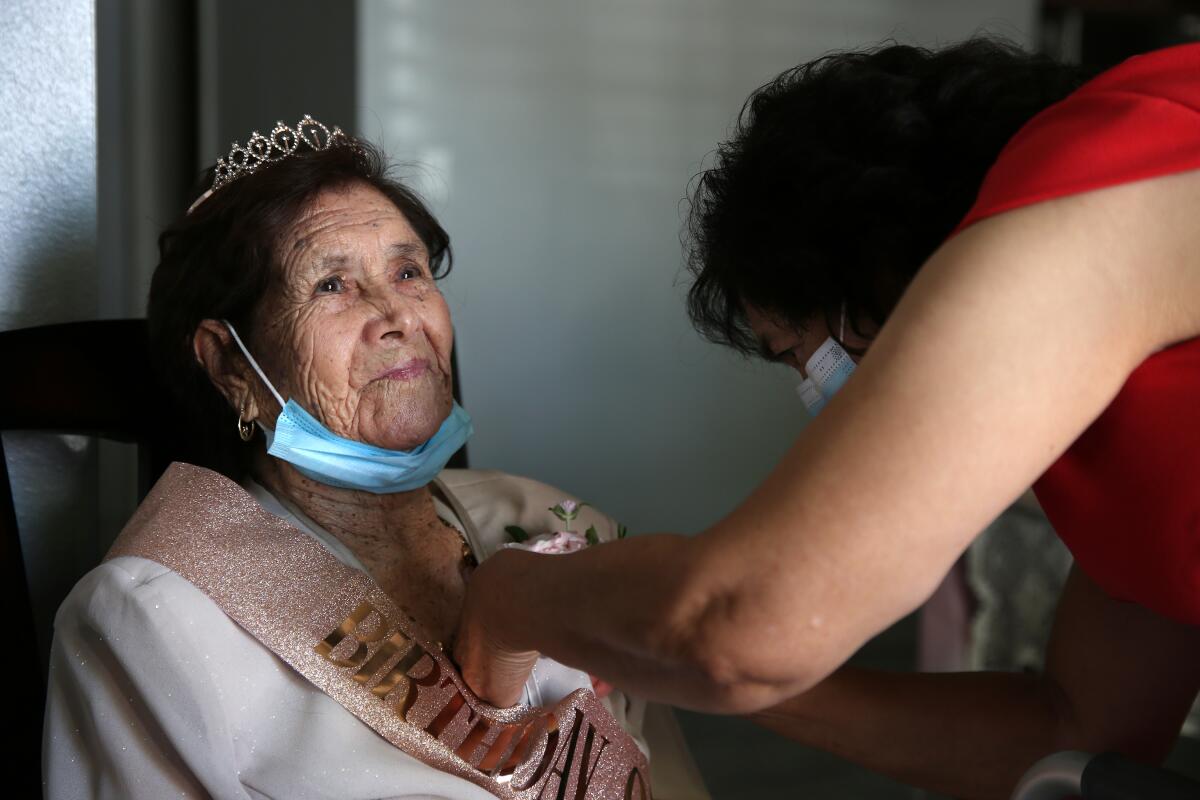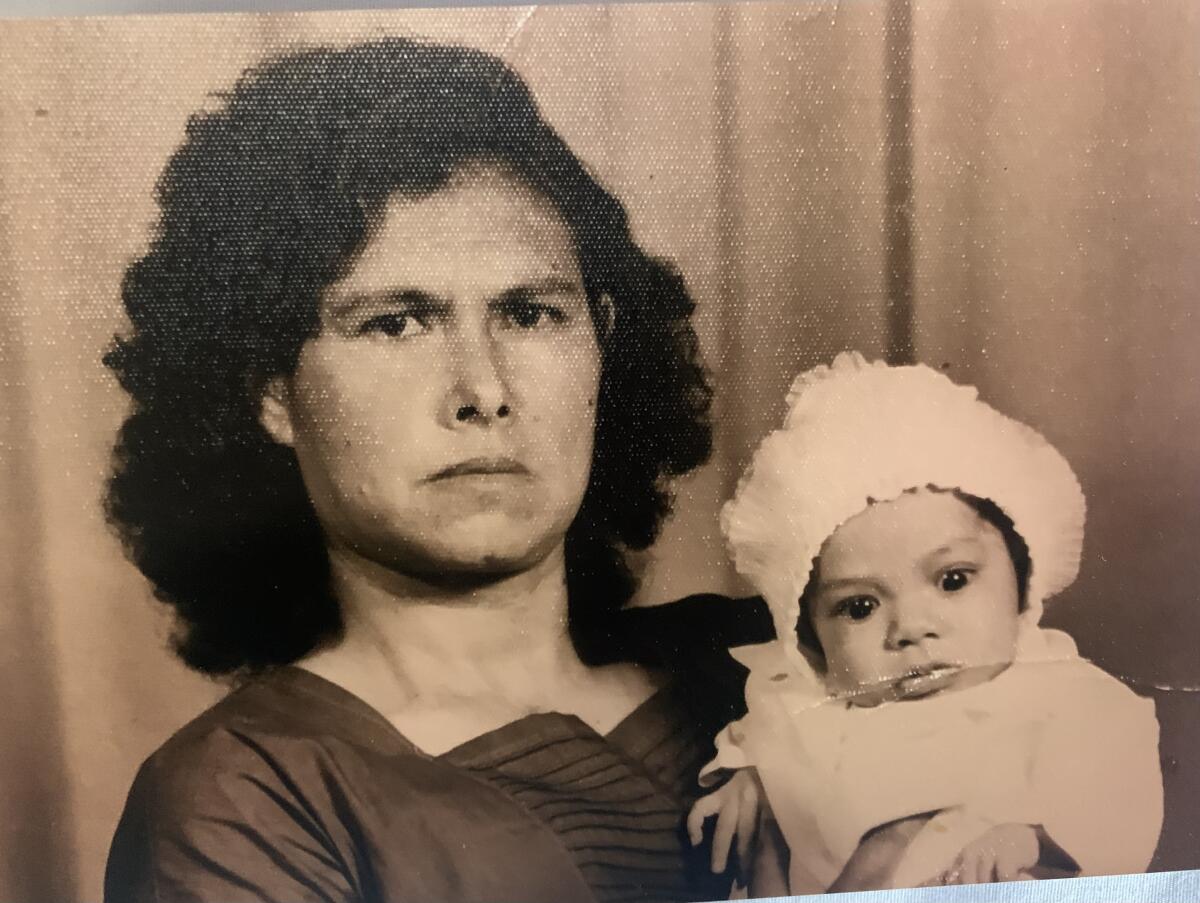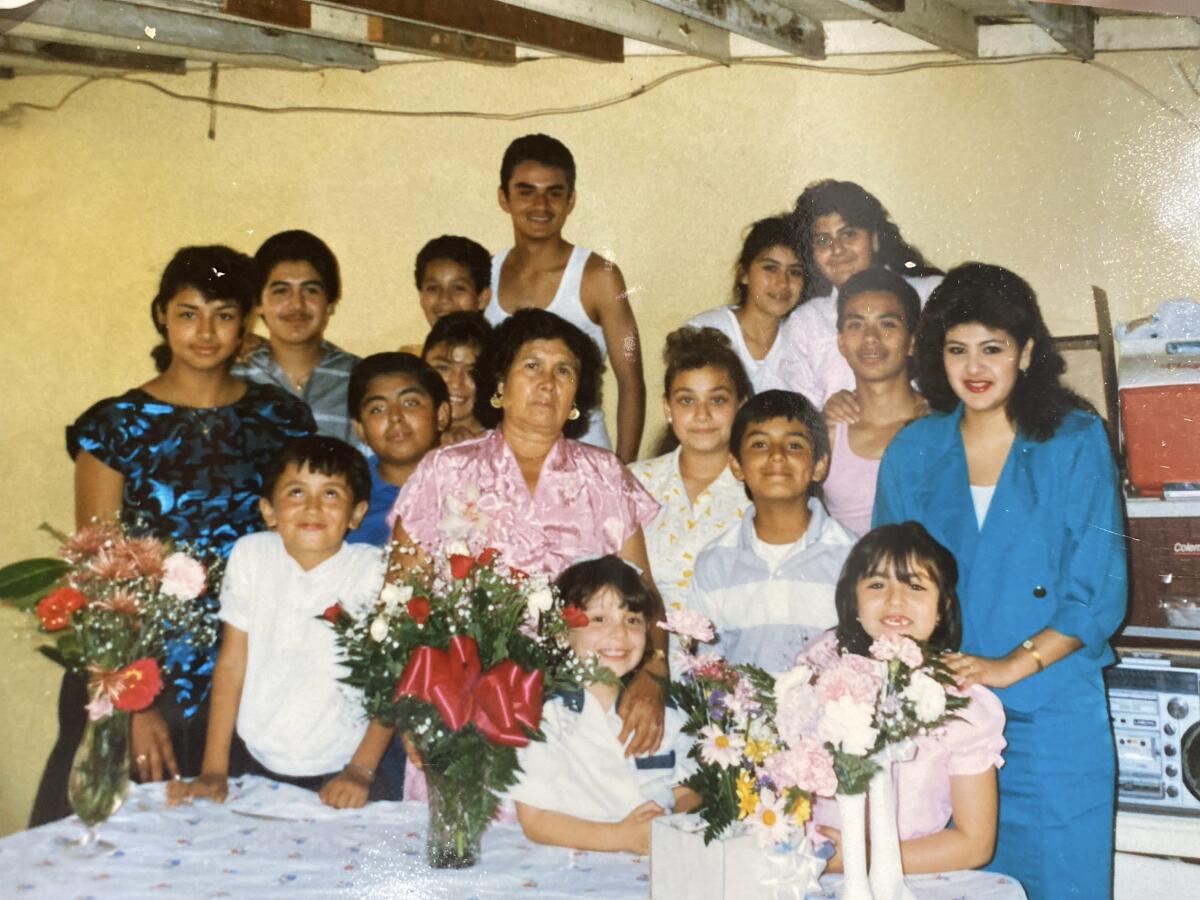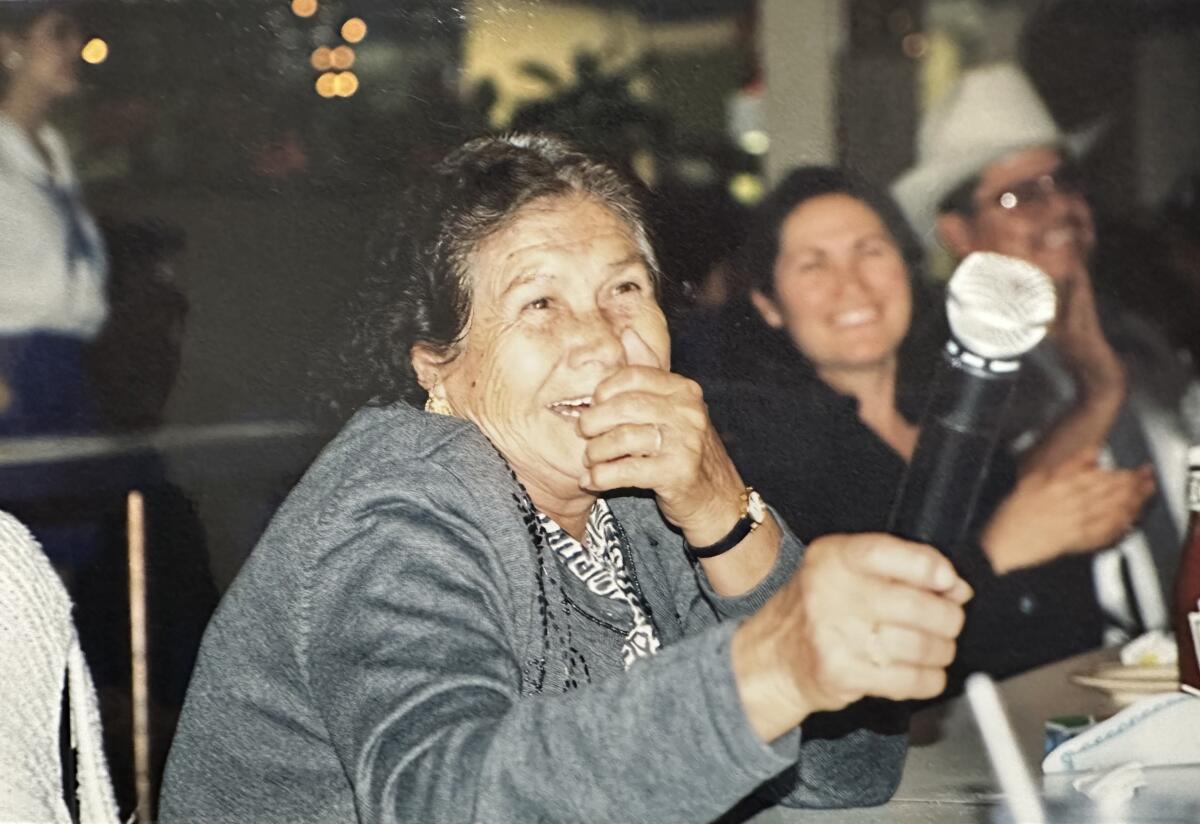Column: Goodbye, Grandma Arellano, and gracias for your 100 years of love

- Share via
One by one, we filed into our matriarch’s living room in East Los Angeles the morning of July 15. Hand sanitizer outside the door, masks inside. Ten minutes, max.
We came to say goodbye.
Two weeks earlier, Angelita Arellano Perez suffered a debilitating stroke that left her hospitalized. Now, she came home to die.
Grandma lay in a bed. A machine pumped oxygen into her nose. Her eyes were closed. In Spanish, I told her how much we all loved her. How we were all proud of her. How my dad, her youngest son, was on his way. How thankful we were for her 100 years of love toward everyone. How Grandma’s example of charity, simple living and rancho smarts would inspire her eight children, 32 grandchildren, 70 great-grandchildren, and 21 great-great grandchildren for the rest of our lives.
She moved as I spoke, straining to acknowledge my gratitude. Descanse, abuelita, I told her. Rest.
Angelita Arellano celebrated her 100th birthday this past weekend. Her family represents the East L.A. Mexican American dream.
When Angelita Arellano breathed her last, she would be the second strong woman I’ve lost in four years. The first was my mami, Maria de la Luz Arellano Miranda, who died all too young at 67, stricken with ovarian cancer. The second was blessed with a long life.
My grandma — and all us cousins almost always called her Grandma among ourselves and not abuelita, because assimilation — was born in 1922 in Jomulquillo, outside the city of Jerez, Zacatecas. She raised her children and a grandson whose mother died shortly after giving birth while her husband, José — who went by Pepe — worked in the fields and as a bracero in the United States. One by one, my aunts and uncles moved to Southern California, part of the jerezano diaspora that now numbers in the tens of thousands. She and my Pepe joined them in 1972.
Although the two frequently went back to Jomulquillo, the United States would be home.

She worked as a seamstress, a babysitter, and a caretaker for elderly neighbors as her children bought homes, and had children of their own. My Tía Nacha and her husband, Cuco, converted the garage for their East L.A. home off Whittier Boulevard into a mini-home for my grandparents and built a patio to accommodate the growing Arellano clan that stopped by almost daily.
Grandma had already lived through epochs. She was just a child when the Cristero Revolt, which saw the Mexican government effectively wage war on Catholics, tore through Zacatecas, and newly married when World War II began. Electricity and potable water didn’t even reach Jomulquillo until Grandma was in her 50s.
By the time Ronald Reagan became this country’s president, Grandma was ready to enter the autumn of her life, happy and finally with little to worry about anymore. But tragedy struck in 1985, when our Pepe died of a heart attack in Jomulquillo at just 67. I was only 6 years old at the time, but I still remember the agony everyone felt as we gathered in my Tía Nacha’s living room to mourn and plan an emergency trip back to the rancho to bury him.
Grandma was a widow at 63, but she would never be alone.
She and my cousin Ramiro eventually moved into a small house on my Tía Nacha’s lot where my Tío Santos had lived. From her tiny kitchen, Grandma fed us all, but especially the younger cousins. They have fond memories of her spoon-feeding them zacatecano home cooking — beans and nopales, pipian, enchiladas, sopa de fideo — while warning them to eat it all lest the Apostles who hung above the dining room table in a painting be disappointed.

In the 1990s, Angelita Arellano became an American citizen. I still remember how proud all of us were, and delighted in the confession she told us: That the person who administered her citizenship test said they would let her cheat on account of her age and her limited English. Grandma refused, saying she had studied too much to all of a sudden get a pity pass.
Typical Grandma.
Grandchildren begat great-grandchildren begat great-great grandchildren, and she cooked for us all well into her 90s, even as arthritis slowed her down and she had to use a walker. I didn’t visit as often as my L.A.-based cousins did, but that just meant I saw her about once a month, usually at the plethora of quinceañeras, weddings, birthdays, baptisms, and graduation parties the Arellanos hosted.
Oh, how Grandma loved a good party. They proved almost impossible at the height of the pandemic, but my female cousins organized Zoom calls for Mother’s Day and a drive-by parade outside my Tía Nacha’s house in 2020, for Grandma’s 98th birthday. She waved to us from the porch wearing a cream-colored skirt and women’s sports coat, tiara, a sash that read “Birthday Queen,” and one of the brightest smiles I ever saw.
In many ways, the last year of Grandma’s life was her most joyous. We started it with Mass at St. Alphonsus in East L.A., where she was a faithful parishioner for decades, and afterward held a huge bash in Uptown Whittier complete with mariachi and banda and a photo of our Pepe next to the guest sign-in book. Soon after, a cousin found out that all centenarians in Los Angeles County Supervisor Hilda Solis’ district were entitled to a hand-painted scroll commending their 100th birthday. My cousin put in a call, we packed my Tía Nacha’s living room as a representative for the supervisor presented Grandma with a massive scroll decorated with purple roses — Grandma’s favorite color and flower.
A few months later, we gathered at my cousin Beatriz’s house in La Puente to celebrate her dad, Gabriel’s, 80th birthday. It was bitterly cold that night, and some family members felt Grandma should stay at home, but she insisted on going. We bundled her up like a teddy bear, and she thanked everyone for coming, but “firstly God, who gave me the license to get to see my firstborn” reach 80 years. Then, everyone danced.
Grandma was so full of life and optimism that we felt she could probably go on a couple more years, even as her body began to fail her. But in the spring, she took a bad fall that broke a metal plate on her left hip fused on after a previous fall. Doctors could not operate on her this time. She was now finally bedridden. That’s why everyone was sworn to silence about my Tío Jesús’ 79th birthday at the American Legion post in Montebello on Memorial Day weekend — it was too risky to move Grandma.
She still found out about two hours before the fiesta started, and received a hero’s welcome as a car pulled into the parking lot and cousins helped her into a wheelchair, looking as regal as ever as the tamborazo blared.
The last time I spent an afternoon with Grandma was at the beginning of July, when I picked up my dad from a nearby bus depot after he returned from Jerez. I could tell she was in pain, but Grandma was as grateful as ever to see us. She asked about my nephew and my wife’s store, and she gave my dad and me a blessing before we left, the way she always did.
The following day, Grandma suffered her stroke. She was in a coma for a few days, woke up to say how much she loved us all, and never spoke again.
She died on a Saturday evening, hours after I said my goodbye. The coroner had given us four hours to bid farewell, so I rushed back to East L.A. from Orange County. My aunts had changed her into a pink nightgown, placed a scarf around her head, and folded her arms across her chest, a rosary and crucifix clasped in her hands.
The agony in Grandma’s face I had seen hours earlier was gone.
My cousins and I filed out on each side of the sidewalk in front of my Tía Nacha’s home when the coroner came, to allow our mothers and fathers some alone time with their mami. They walked behind the gurney that carried Grandma to an ambulance while singing two of her favorite hymns: “Adios, Reina del Cielo” (“Goodbye, Queen of Heaven”) and “La Guadalupana,” a devotional to Grandma’s favorite saint, the Virgin of Guadalupe.
The tears came fast and couldn’t be stopped even by the applause we gave our abuelita as she was wheeled past us. Then two neighbors spoke up. Through their own tears, they said we were lucky. Their mother had died of COVID-19 and had no chance to bid farewell to her the way we just had. The sisters proclaimed their love for Angelita Arellano and marveled how, even into her 90s, she walked unassisted down the street.
“I wish I could be just a third of the woman she was,” one of the sisters said. “Celebrate her as the warrior she was. Don’t be sad. Have a get together of joy for her.”
That was the perspective we needed.

There was still a funeral and a wake and nine days of rosaries to plan. But before we all left, my cousin Susan reminded us in Spanglish that Grandma wanted us to dress in purple and white. “Like she said: ‘I don’t want you showing up to my funeral como zopilotes en negro [like vultures in black].’ ”
Typical Grandma. Man, will we miss her.
More to Read
Sign up for Essential California
The most important California stories and recommendations in your inbox every morning.
You may occasionally receive promotional content from the Los Angeles Times.











